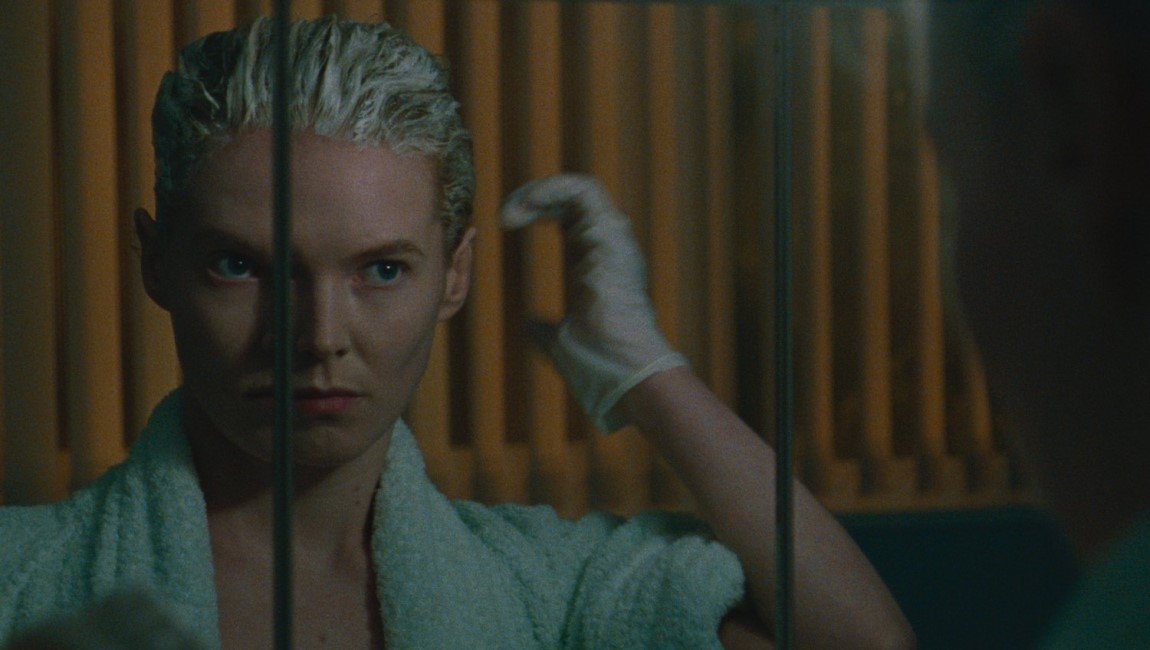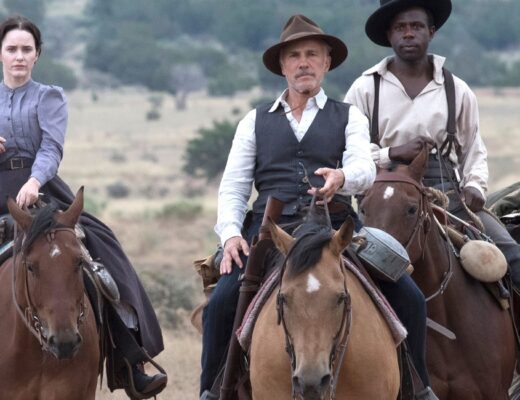One of the most harrowing legacies of Margaret Thatcher’s conservative government had nothing to do with economics, labor unions, or privatization. Instead, Section 28 was concerned with so-called “family relationships,” and it was through this euphemism that the government essentially enshrined homophobia as law by preventing local councils and officials from “promoting homosexuality.” Introduced in 1988, it wasn’t repealed in England until 2003; a number of prominent politicians, including future PM David Cameron, voted for it (in 2009, he apologized for doing so). It’s during these years of repression and paranoia that Georgia Oakley’s debut film Blue Jean takes place.
The titular Jean, a divorcee with a tomboyish, bottle-blonde pixie cut, is a PE teacher at a secondary school in Newcastle. She’s first seen dying her hair in her bathroom, and Blue Jean is ultimately a film not only about identity, but about artifice and presentation more broadly. Whether it’s her sister and brother-in-law’s impenetrable lacquer of heterosexuality or the long black duster she dons when she slips off at night, it doesn’t matter that Jean is actually closeted: the insidious effect of laws such as Section 28 is the way they chip away at privacy so that even the most ordinary people are unwittingly exposed.
By day, Jean coaches a netball team and makes excuses for skipping the pub with her homophobic colleagues. By night, she hangs out with a group of older, butcher, more confident lesbians at an underground gay bar. Her girlfriend, Viv (an endearingly earnest Kerrie Hayes), who sports a shaved head, studded leather jacket, and numerous piercings, is both an inspiration and a liability to Jean’s double life — a reminder of who she could be in the future, but a threat to who she is in the present. Viv, for her part, is forthright with her affection, but understandably unwilling to concede any of her hard-won truth back into the closet.
This already-tenuous equilibrium is shattered by the arrival of a new student, Lois (Lucy Halliday), who intuits that there’s more to her quiet gym teacher than meets the eye. Her suspicion is confirmed when she and Jean spot each other at the club, and a tense confrontation has the effect of not only complicating their teacher-student relationship, but exposing the depth of Jean’s timidity to a sad and disgusted Viv. But how is Jean expected to stand up for a student when doing so would put her own livelihood at risk? Meanwhile, a triangle of sorts forms between Jean, Lois, and a bully named Siobhan, who senses and cruelly exploits the source of her classmate’s awkwardness. Jean, faced with a moment to stand up for her newest pupil, can’t bring herself to orchestrate what would surely be a pyrrhic victory.
In her first leading role, Rosy McEwen appears in nearly every scene and is quietly compelling as the skittish, uncertain Jean. She clearly wants what Viv and her other friends have: a strong sense of identity, a righteous fuck-the-man attitude, and a willingness to nurture and mentor younger queer women. But when presented with the opportunity, she balks. McEwan nails the constant paranoia of living as an outsider under the thumb of a repressive government, where nosy neighbors are one phone call from ruining her life and where even her family pretends her identity doesn’t exist. As a gym teacher, she can’t help but need to touch her students, whether it’s positioning them for a netball game or bandaging a scrape, and these seemingly innocuous moments are fraught with tension and loom larger than life on screen, mirroring the scale of their destructive potential. Alongside this unease runs a current of sadness, turning the film into an understated elegy for what should otherwise be normal, everyday lives.
In conflict with this poignant character study, though, is some heavy-handed symbolism, including Jean’s meditation tape self-destructing and the fight-or-flight talk she gives to her netball team at the beginning of the film. Blue Jean is also rather aesthetically on-the-nose, fixed firmly within its era, down to its synth-pop soundtrack and grainy 18mm film stock. But given the current state of being queer in America, in which record-breaking visibility seems inversely proportional to having actual rights, the inner reserve of courage Jean eventually taps into resonates all the more powerfully.
Published as part of InRO Weekly — Volume 1, Issue 23.
Enjoy our content? Want early access to features, interviews, and more? Support us on Patreon!







